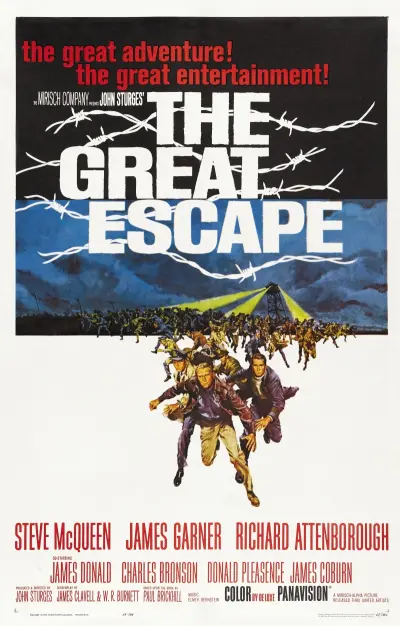
I am pleased to delve into the revered cinematic piece that is The Great Escape. Imagine the year is 1963, and an epic story of determination and unity is about to unfold before you. Set against the bleak backdrop of World War II, our narrative takes place within the confines of Stalag Luft III, a German POW camp touted as impenetrable. Within these walls, we are introduced to a diverse group of intrepid Allied prisoners, each in possession of a distinctive set of skills that prove invaluable to an ambitious escape plan.
The architect behind this daring endeavor is Squadron Leader Roger Bartlett, portrayed with resolute charm by Richard Attenborough. He sets the goal ambitiously high: to facilitate the escape of 250 prisoners. A suspense-laden tale emerges as the captives, including Captain Virgil Hilts, "The Cooler King" (a captivating Steve McQueen), Flight Lieutenant Danny Velinski, "The Tunnel King" (played by a stalwart Charles Bronson), and several others, collaborate to construct not one, but three subterranean passages—an endeavor characterized by the whimsical codenames Tom, Dick, and Harry.
As the story progresses, it becomes evident that The Great Escape transcends the mere logistics of the escape; it is a profound study into the refusal of the human spirit to remain confined. The plot skillfully balances nail-biting tension with moments of both light-hearted and profound depth, heightening the personal stakes of the narrative. The audience is not merely observing the events; we are intimately connected with the destinies of these individuals, fervently hoping for their ultimate success.
Addressing the thematic essence of this esteemed classic, the film glorifies the principles of liberty, the resilience of human willpower, and the cooperation that flourishes in difficult times. These tenets permeate the film as each character lends their specific expertise to the group's venture, showcasing the principle that unity engenders strength. Each shovelful of earth, each meticulously crafted strategy, and each hurdle surmounted reaffirms the inherent human impulse to push back against the barriers imposed by life.
Nonetheless, the journey is not devoid of stark realism; Hollywood heroism is interspersed with gritty elements reflective of truth. As the characters painstakingly burrow towards liberation through the tunnel named Harry, the air is thick with suspense and the constant menace of discovery—a vivid tribute to the perilous endeavors of actual POWs. The Great Escape's story, imbued with authenticity, honors the relentless spirit of those who endured the events that inspired the film.
Ultimately, the varied fates of the characters serve to accentuate a poignant truth: even the most audacious of escapes carry their own price. Though the film concludes with a mixture of victory and sorrow, the enduring message it imparts is unmistakable. The Great Escape is more than just a war narrative. It stands as an immortal beacon of perseverance, innovation, and the intertwined nature of our adversities and victories. The narrative heralds the perpetual allure of hope and the unabated quest for freedom—a cinematic homage to the enduring attributes of the human condition.

